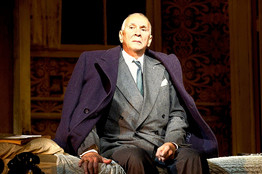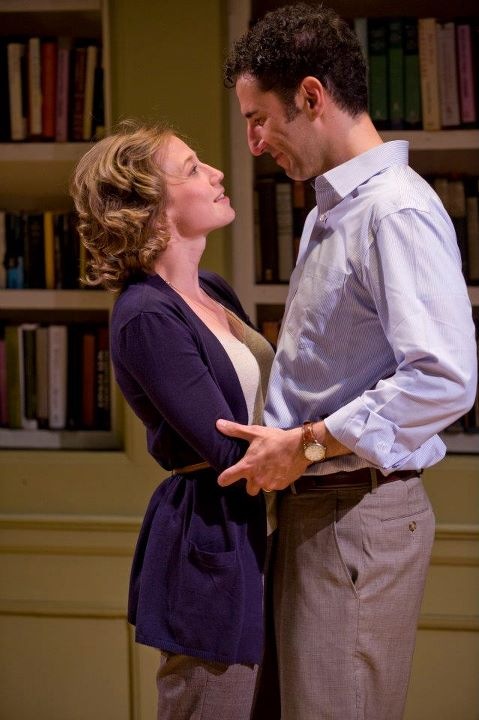“There was no place for brutal honesty with a child. Everyone felt that. It was taken in the Western countries as a rule of nature. So we raise our children with love and comfort for a future they can only find disappointing.”
Scott Turow, The Burden of Proof
Archives for October 2011
TT: Daddy dearest
The New York theater season is now rolling, and The Wall Street Journal has given me an extra column this week so that I can hold forth at greater length on the Broadway revival of Terence Rattigan’s Man and Boy. Here’s an excerpt.
* * *
In England Terence Rattigan is a growth stock, a purveyor of immaculately crafted plays who was immensely popular in the ’40s and ’50s, went out of fashion in the ’60s and is now popular once more. Not so in America, where the once-beloved author of “The Browning Version” and “The Winslow Boy” remains largely unknown to under-50 theatergoers. It’s been at least a decade since a Rattigan play received a high- or medium-profile professional production anywhere in this country, and the Roundabout Theatre Company’s production of “Man and Boy,” written in 1963, marks the first time that any of his plays has been seen on Broadway since 1998. This being the centenary of his birth, it makes sense that the Roundabout has revived one of his plays as a vehicle for Frank Langella, and it’s no surprise whatsoever that Mr. Langella, one of our greatest stage actors, makes the most of the opportunity. The surprise is that “Man and Boy,” which flopped hard in 1963 and sank without trace, turns out to be a tautly effective melodrama whose subject–the villainy of a financial “wizard” who is unmasked as a big-time swindler–is as timely as tomorrow’s tweets….
 Mr. Langella, who was so fabulous in “Frost/Nixon,” is a crook of a different color in “Man and Boy,” courtly and exquisitely well mannered, a man whose whole life has been an act and who is determined to keep it up all the way to the final curtain. Yes, his performance is stagey, but deliberately so, and by playing the first half of “Man and Boy” in the silken tones of high comedy, he sets the audience up for the crash that everyone knows is just around the corner.
Mr. Langella, who was so fabulous in “Frost/Nixon,” is a crook of a different color in “Man and Boy,” courtly and exquisitely well mannered, a man whose whole life has been an act and who is determined to keep it up all the way to the final curtain. Yes, his performance is stagey, but deliberately so, and by playing the first half of “Man and Boy” in the silken tones of high comedy, he sets the audience up for the crash that everyone knows is just around the corner.
The trouble with actors like Mr. Langella is that they have a way of washing their colleagues off the stage, and that’s what happens here. Adam Driver and Virginia Kull, who plays his flapperish girlfriend, seem all but weightless by comparison. It doesn’t help that Maria Aitken, the director, seems to have nudged her cast in the direction of broad-brush caricature. Mr. Langella is supposed to be stagey–that’s the point–but his regal carriage would make better theatrical sense were it framed by more conventionally realistic supporting performances….
Rattigan wrote stronger plays than “Man and Boy,” “The Deep Blue Sea” and “Separate Tables” in particular, and he would have been even better served had the Roundabout revived one of them instead. Nor does this production, save for Mr. Langella’s ennobling presence and Ms. Aitken’s shrewd cuts, make the best possible case for “Man and Boy.” But it’s still what the Brits call a rattling good show…
* * *
Read the whole thing here.
TT: Almanac
“As life had repeatedly shown him, there was usually something to other people’s pleasures.”
Scott Turow, The Burden of Proof
TT: Escape
 Mrs. T and I had a horrendously busy time of it this summer, and we didn’t get to take a vacation because our plate was piled high with business- and family-related travel. As a result, we’re both bushed, so we’ve carved three nights out of our schedules and will depart tomorrow afternoon for Ecce Bed and Breakfast, the superlatively tranquil Southern Catskills retreat where we spent our honeymoon four years ago and to which we have since returned as often as possible.
Mrs. T and I had a horrendously busy time of it this summer, and we didn’t get to take a vacation because our plate was piled high with business- and family-related travel. As a result, we’re both bushed, so we’ve carved three nights out of our schedules and will depart tomorrow afternoon for Ecce Bed and Breakfast, the superlatively tranquil Southern Catskills retreat where we spent our honeymoon four years ago and to which we have since returned as often as possible.
In order to bring off this feat of leisure, I saw four shows and wrote five pieces in the past four days. That’s quite enough work to hold me for the moment, so please forgive me if I don’t post anything more than the usual almanac entries, videos, and theater-related stuff between now and next Monday.
Don’t write. Don’t call. It could get ugly.
TT: Just because
Tony Bennett sings “Who Can I Turn To?” in 1978:
TT: Almanac
“Some spoke of the nobility of the law. Stern did not believe in that. Too much of the grubby boneshop, the odor of the abattoir, emanated from every courtroom he had entered. It was often a nasty business. But the law, at least, sought to govern misfortune, the slights and injuries of our social existence that were otherwise wholly random. The law’s object was to let the seas engulf only those who had been seleted for drowning on an orderly basis. In human affairs, reason would never fully triumph; but there was no better cause to champion.”
Scott Turow, The Burden of Proof
TT: Sauce for the gander
In today’s Wall Street Journal drama column I write about a Chicago show, Writers’ Theatre’s revival of Tom Stoppard’s The Real Thing, and an off-Broadway show, the Atlantic Theatre Company’s premiere of Adam Rapp’s Dreams of Flying Dreams of Falling. The first is better–by far. Here’s an excerpt.
* * *
 Tom Stoppard is known for writing plays of ideas that are sufficiently witty to sugar the pill of their eggheady subject matter. “The Real Thing,” though it contains far more than its fair share of glittering wit and bristling complications, is a play of a different sort, a study of a modern marriage built atop the wreckage of unfaithfulness that threatens to be destroyed by the same destructive force that brought it into being. Small wonder that three decades after it opened in London, “The Real Thing” remains Mr. Stoppard’s best-loved play. Not surprisingly, it gets done fairly often, but I doubt that “The Real Thing” will soon receive a better production than the one now playing at Chicago’s Writers’ Theatre. Staged with heartfelt clarity by Michael Halberstam, the company’s artistic director, this is the kind of show that reminds you of why you go to the theater in the first place, and makes you wonder why anybody settles for anything less….
Tom Stoppard is known for writing plays of ideas that are sufficiently witty to sugar the pill of their eggheady subject matter. “The Real Thing,” though it contains far more than its fair share of glittering wit and bristling complications, is a play of a different sort, a study of a modern marriage built atop the wreckage of unfaithfulness that threatens to be destroyed by the same destructive force that brought it into being. Small wonder that three decades after it opened in London, “The Real Thing” remains Mr. Stoppard’s best-loved play. Not surprisingly, it gets done fairly often, but I doubt that “The Real Thing” will soon receive a better production than the one now playing at Chicago’s Writers’ Theatre. Staged with heartfelt clarity by Michael Halberstam, the company’s artistic director, this is the kind of show that reminds you of why you go to the theater in the first place, and makes you wonder why anybody settles for anything less….
Mr. Halberstam, whom New York audiences know as the director of “A Minister’s Wife,” has given us an unusually intimate staging of “The Real Thing” that profits no end from being performed in Writers’ Theatre’s 108-seat house. Punch lines that would need to be nailed to the back wall of a Broadway-sized theater can instead be tossed off with deceptive casualness, allowing the audience to concentrate not on Mr. Stoppard’s jokes but on the increasingly hurtful truths that his characters tell one another….
The ever-trendy Adam Rapp is at it again with “Dreams of Flying Dreams of Falling,” a play that is as trite as it is smug. The setting is “an opulent Connecticut home” and the subject is the soulnessness of the upper middle classes, whose members, Mr. Rapp assures us, are empty shells of brittle good manners whose only hope of redemption is to have wild sex and/or to be led by their black servants down the path to politico-spiritual enlightenment….
* * *
Read the whole thing here.
TT: Almanac
“When you have loved as she has loved, you grow old beautifully.”
W. Somerset Maugham, The Circle
